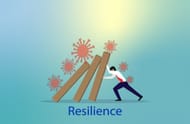Are you familiar with the path to resilience? Life is a journey filled with both triumphs and challenges. Adversity is an inevitable part of the human experience, but it is our response to these difficulties that shapes our ability to overcome and thrive. Resilience—the capacity to bounce back from adversity—is a remarkable quality that can be nurtured and strengthened.
This article explores the path to resilience, unveiling the strategies and mindset necessary to navigate life's obstacles and emerge stronger on the other side.
What Is The Path To Resilience

Resilience is not a fixed trait but a dynamic and learnable skill. It is the ability to adapt and recover in the face of adversity, to withstand and even grow from life's challenges. Resilience involves psychological, emotional, and cognitive processes that enable individuals to bounce back, build coping mechanisms, and maintain a sense of well-being amidst turmoil. The path to resilience is not without roadblocks and speed bumps. Here are a few ways you can use resilience to bounce back stronger:
Embracing Adversity as an Opportunity
Adversity often brings discomfort, uncertainty, and pain. However, it also presents an opportunity for growth and self-discovery. By reframing adversity as a teacher, individuals can shift their perspective and embrace the lessons and strengths that emerge from difficult experiences. Each setback becomes a stepping stone on the path to resilience.
Cultivating a Growth Mindset
A growth mindset is a key component of the path of resilience. It involves believing in the capacity for personal growth and seeing failures or setbacks as temporary and surmountable obstacles. Embracing a growth mindset enables individuals to view challenges as opportunities for learning, rather than insurmountable barriers.
Building Social Support Networks

Social support plays a vital role in fostering resilience. Strong connections with family, friends, and communities provide emotional support, encouragement, and a sense of belonging. Cultivating healthy relationships and seeking support during challenging times can help individuals navigate adversity and find the strength to bounce back.
Developing Effective Coping Mechanisms
Resilient individuals develop effective coping mechanisms to manage stress and adversity. These mechanisms can include practicing self-care, engaging in relaxation techniques, such as meditation or deep breathing exercises, and adopting healthy lifestyle habits.
Developing healthy coping strategies enhances emotional well-being and equips individuals to navigate future challenges.
Acceptance and Adaptation
Resilience involves accepting the reality of a situation and adapting to the changes it brings. It requires embracing flexibility and finding new ways to cope and thrive. By letting go of what cannot be changed and focusing on what can be controlled, individuals can shift their energy toward finding creative solutions and forging a new path forward.
Learning from Resilient Role Models

Resilience can be cultivated by observing and learning from resilient role models who have triumphed over adversity. Stories of individuals who have overcome significant challenges can inspire and motivate, showing us that resilience is not only possible but achievable. Learning from their experiences and strategies can provide valuable insights and guidance on our own path to resilience.
Embracing Self-Compassion
Self-compassion is a fundamental aspect of resilience. It involves treating oneself with kindness, understanding, and acceptance during difficult times. Rather than self-criticism or self-blame, self-compassion fosters a nurturing and supportive inner dialogue, providing a solid foundation to bounce back from setbacks and continue the journey toward resilience.
Resilience is not a trait bestowed upon a fortunate few but a journey available to all who choose to embark upon it. It is a process of self-discovery, growth, and transformation that empowers individuals to navigate adversity with strength and fortitude. By embracing a growth mindset, building supportive relationships, developing effective coping mechanisms, and fostering self-compassion, we can forge a path to resilience that allows us to weather life's storms and emerge stronger on the other side.
Through resilience, we discover the depth of our inner strength and our ability to overcome obstacles that once seemed insurmountable. It is a testament to the human spirit's indomitable nature, a reminder that within us lies the power to not only survive but thrive in the face of adversity. As we navigate life's challenges, let us remember that setbacks are not indicative of failure but stepping stones on the path to resilience. With each setback, we have the opportunity to learn, adapt, and grow, transforming our experiences into valuable lessons that shape our character and fuel our resilience.